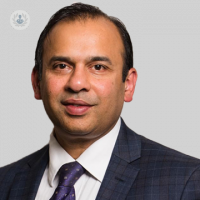An expert guide to laparoscopic gallbladder surgery
Written by:Gallstones can cause debilitating symptoms and when this is the case, removal surgery is unfortunately the only option. One way that gallbladder removal surgery is undertaken is via laparoscopy.
Here to offer a detailed look at what’s involved in laparoscopic surgery for gallbladder removal is esteemed consultant general surgeon Mr Shwetal Dighe.

What is laparoscopic gallbladder surgery?
Surgical removal of the gallbladder can be performed laparoscopically (keyhole) in 95 per cent of cases. Approximately four small holes (about one to two centimetres) are made in the tummy wall. Through these, special long instruments are used to free up the gallbladder and its stones from underneath the liver and completely remove it. A miniature camera is inserted through one of the four keyholes which is used to view the gallbladder on a TV screen.
What does laparoscopic gallbladder surgery treat?
The gallbladder is a pear-shaped organ, which is located in the liver’s underside, in the abdomen’s right upper quarter. It’s connected by ducts, or tubes, that go to the liver and duodenum (intestine). Bile, which a substance that’s essential for digesting fats, is produced by the liver and stored in the gallbladder. The gallbladder contracts and forces bile into the gut, when food, especially greasy, is eaten. Due to imbalances in the chemical composition of the bile, stones can occasionally form in the gallbladder.
While the majority of people will have no symptoms and won’t require any treatment for their gallstones, they can cause the following symptoms in others:
- Episodes of indigestion, nausea and bloating.
- Severe pain episodes that may be precipitated by eating fatty food. This pain is caused by a blockage caused by the stones in the gallbladder exit and preventing it from emptying.
- Stones can cause gallbladder infection and make you very ill. You will be needed to be admitted to hospital to treat the infection either by antibiotics or emergency surgery.
- This is caused by stones migrating from the liver to block the main drainage pipe in the liver.
- Gallstones can trigger pancreatitis (inflammation of the pancreas) in some cases, which is potentially a life-threatening condition.
If the gallbladder causes symptoms, surgical removal of the gallbladder is the only management option.
Is laparoscopic gallbladder removal major surgery?
Laparoscopic gallbladder surgery isn’t major surgery and currently is the most common general surgical procedure that’s performed. It can be done as a day case procedure where you go home on the same day, and the rate of post-operative complication is about two to three per cent.
How painful is laparoscopic gallbladder surgery?
Laparoscopic gallbladder surgery has less likelihood of severe pain and is generally well tolerated. During the first 24 to 48 hours, you can expect some soreness. A very small number of patients react to distension of the abdomen during surgery, and can experience sharp pain in the abdomen or shoulder. It’s important to get medically assessed in order to rule out any complications if pain persists.
How long does it take to recover from this procedure?
You’ll probably be able to get back to your normal activities within a week to 10 days with laparoscopic gallbladder surgery. These activities include:
- Having a shower
- Driving
- Walking upstairs
- Lifting
- Working
- Sexual intercourse
As soon as you are ready, you can return to your normal diet.
If you’re concerned you require gallbladder surgery, or want treatment for Mr Dighe’s other areas of expertise such as hernia or anti-reflux treatment, arrange a consultation with him via his Top Doctors profile.



